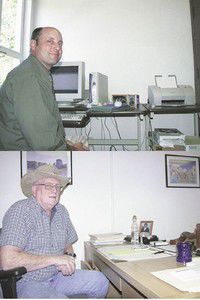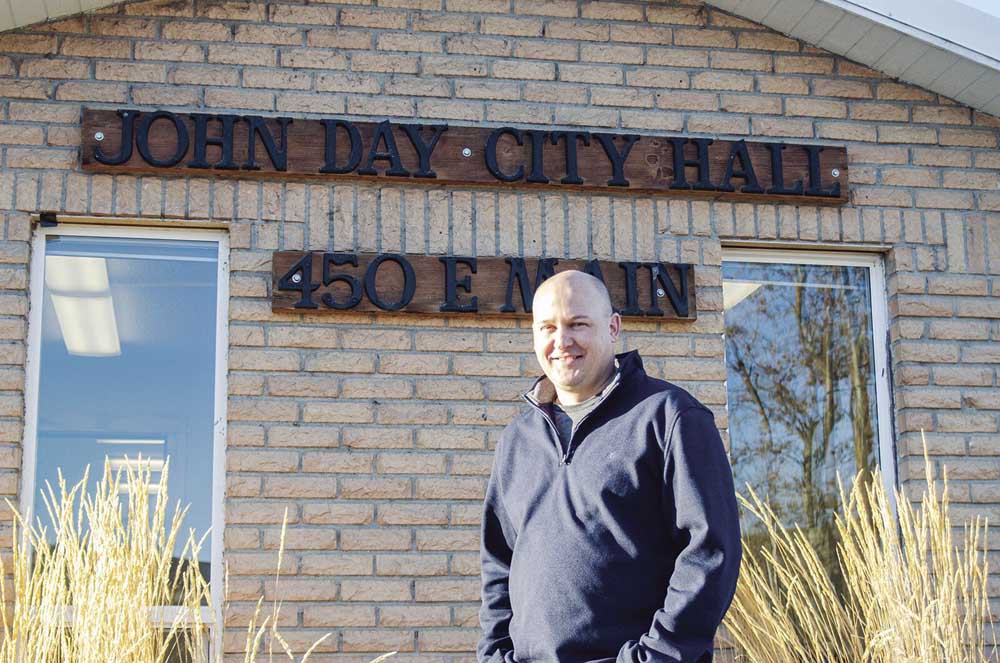Grant County judges bring wealth of experience to bench
Published 5:00 pm Tuesday, August 13, 2002

- The Eagle/DAVID CARKHUFF<br> Circuit Court Judge William Cramer Jr. (top) said his job
CANYON CITY – Grant County’s two justices, Circuit Court Judge William Cramer Jr. and Justice of the Peace Terry Farrell, understand the real world.
Cramer, 47, grew up in Burns and worked for the lumber industry and the Forest Service while pursuing his law degree. Farrell, 60, while born in Corvallis, from the age of 3 grew up in Grant County. He filled his resume with ranch work, stints in feed and grocery stores in John Day, Burns and Seneca and a longer career in the lumber industry, intermingled with a five-year job in the Grant County assessor’s office.
In a coincidence worthy of mention, both men worked for Edward Hines Lumber Co.
Cramer gained experience on a road crew, worked in surveying and pulled the “green chain,” or the raw lumber, in a mill. Farrell, among his other pursuits, was a planer superintendent for John Day Lumber (formerly Edward Hines) in Seneca.
Where are these men today? Stationed in judicial offices in the Grant County Courthouse, hearing cases that affect the lives of their fellow citizens. Each volunteered part of a busy day to comment on their professions.
Judge William Cramer Jr.
“We have seen a steady growth in cases in both counties, which surprises me, because our populations are going down,” Cramer said. “Part of it is how our laws are enforced.”
For example, aggressive narcotics prosecutions in Harney County have made a difference in workload.
“The number of drug cases and convictions have really been high in Harney County,” he said.
Grant County has been harder to assess. Part of the reason is the number of district attorneys – four, counting the current acting DA, Brenda Rocklin – who have filled that office in the past six years. Recently, misdemeanor cases have been filed in circuit court, adding to the workload.
“I don’t know how that’s going to change under our new DA,” Cramer said, referring to the upcoming election on the November ballot for district attorney.
From 2001-2002, the 24th judicial district has experienced a 12.61 percent increase in caseload, Cramer reported. The district is ranked second in the state for the need of a second judge. Cramer estimated that his breakdown of cases is roughly 55 percent to 45 percent, Grant County to Harney County.
Asked for his guiding philosophy, Cramer said, “I take an oath to uphold the Constitution of the Oregon and the United States and to be an impartial judge.”
He added that independent judges, following the intent of the framers of the constitutions, are “an integral part of our legal system.”
“It comes down to trying to be fair,” he concluded.
Running for re-election this spring was a decision he reviewed carefully, Cramer said.
Cramer added that the position provides satisfaction but also the inevitable stress of weighing important cases.
“When you’re making decisions that affect people, when you do your best and feel you’ve done a good job, there’s some satisfaction there,” he said. “On the other hand, when you’re making decisions about people’s lives, it does wear on you emotionally.”
Cramer commutes from Burns, which he said allows him time to reflect on cases and also gives him time to “decompress.”
Asked about misconceptions that the public might have about his job, Cramer said he typically is not briefed any more than a jury before a trial or hearing begins; and he doesn’t make decisions about which charges are filed – that’s the district attorney’s job.
“I give an impartial hearing, and make a decision once I hear the facts,” he said.
Justice of the Peace Terry Farrell
In March, Farrell discovered a bump on his collarbone. A visit to the doctor led to a diagnosis of lymphoma, or a tumor of lymphoid tissue. Cancer was detected. Today, Farrell is optimistic that early detection has given him a strong chance to beat the disease. He is undergoing treatments of chemotherapy.
Farrell remains committed to the position to which Grant County voters elected him. One and a half years into his new job, Farrell said he loves what he does.
“I love coming to work in the morning,” he said.
Consistency is his guiding principle. Farrell does not operate off of legalism; he tries to show compassion for those who enter his court. Often, if a fine is paid in full, it’s because the plaintiff lives out of the area and mailed a check. Otherwise, it’s not uncommon for Farrell to reduce fines to a level that will not overwhelm a plaintiff.
Farrell said he especially enjoys helping young people, many of whom are cited for traffic violations. Since Farrell has taken office, the court has contracted with a traffic-safety instructor from Bend to allow violators a chance to reduce their fines and learn basic traffic safety.
Many of Farrell’s cases involve low-income citizens. Trends in Grant County Justice Court include increased small-claims cases and evictions, both of which Farrell attribute to the struggles of people to make ends meet in a tough economy.
Farrell himself tired of working in one of those struggling industries, the lumber-production business. He formed his decision to run for Justice of the Peace while deciding that maybe it was time for a new career.





